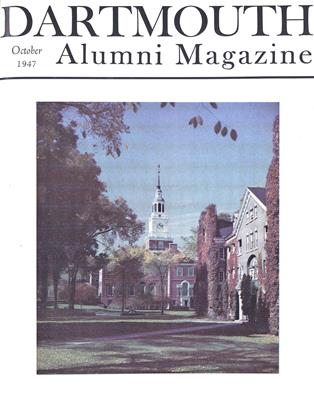By BuddSchulberg '36. Random House, 1947, [vi]+ PP. 344, $4.00.
Budd Schulberg's most recent novel is, contrary to what is usually the fate of repeats, a much greater work than What Makes SammyRun. Again he has used the theme of the man who will do anything "for money, but the theme concerns a man who is a much larger character and who is after much more money than Sammy. Luckily, Nick Latka, not the hero but certainly the motivating force in the novel, is developed in a more mature, a more masterful and a more complete way than the earlier character.
Nick is the background, the evil genius, the animated backdrop for the action.
"I could picture that little talk—Nick cool, immaculate, quietly implicit; Vince with his tie loosened so he could open his shirt and let ms fat neck breathe, the sweat coming out of his fleshy face as he tried to wiggle off Nick s hook —just a talk between two businessmen concerning lump sums, down payments and percentages, just a quiet little talk and yet the atmosphere tense with unheard sounds, the blackjack s thud, the scream torn from the violated groin, the spew of blood'and broken teeth."
Against this backdrop, and motivated by it, the tragedy occurs.
Eddie Lewis, a press-agent, is the narrator and hero of the story. Eddie, two years at Princeton, a partially written play in his trunk about the boxing racket (incidentally, Nick's chief source of income), in love with a Smith graduate, simply can't tear himself away from Nick because Nick means money.
"Damn it, I was making a living. I wasn't rolling anybody; the lies I told were just ordinary American business lies like everybody else s lies. They didn't do too much harm."
But they did do harm. They undermined Eddie's integrity, they separated him from the girl he loved, and they helped wreck an innocent peasant from the Argentine, Toro Molina, the man whom Eddie, and eventually Nick, built up to be the heavy weight champion of the world.
The whole novel is a violent and most coherent protest against sharp practice and dirty tactics in the boxing game, but it rises above its crusading and becomes a forceful work of art. Schulberg has the good sense, and good taste, to exploit a social protest and create a good novel. The situations are real and exciting; the characters develop in the classic manner, that is to say that they grow or diminish in the reader's mind according to their strength or weakness. In saying this I mean to compliment the author on his ability to make a vivid and convincing protest against a social evil and yet maintain his artistic balance enough to create a moving piece of fiction.
 View Full Issue
View Full Issue
More From This Issue
-
 Article
Article"Enter ye in by the Narrow Gate ..."
October 1947 By ALBERT I. DICKERSON '30, -
 Article
ArticleTHE GREAT ISSUES COURSE
October 1947 By THOMAS W. BRAD EN '40 -
 Class Notes
Class Notes1918
October 1947 By ERNEST H. EARLEY, DONALD L. BARR -
 Class Notes
Class Notes1915
October 1947 By SIDNEY C. CRAWFORD, CHANDLER H. FOSTER -
 Class Notes
Class Notes1913
October 1947 By WARDE WILKINS, ROBERT O. CONANT -
 Class Notes
Class Notes1943
October 1947 By FRED F. STOCK WELL, WILLIAM T. MAECK
Books
-
 Books
Books"Small Store Advertising"
December 1924 -
 Books
BooksPREPARATION FOR CHILDBIRTH: A LAMAZE GUIDE.
OCTOBER 1971 By JOHN S. LYLE '34, M.D. -
 Books
BooksDemystifying the Crisis
MARCH 1982 By Leonard L. Glass '64 -
 Books
BooksCelebration
January 1977 By R.H.R -
 Books
BooksThe Country Remembers
December 1979 By R.H.R. -
 Books
BooksTHE IDEA OF PROGRESS IN AMERICA,
April 1945 By Robert E. Riegel.

